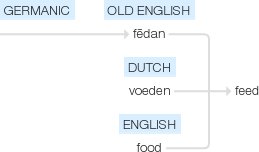Feed
Old English fēdan (verb), of Germanic origin; related to Dutch voeden and food.
wiktionary
From Middle English feden, from Old English fēdan(“to feed”), from Proto-Germanic *fōdijaną(“to feed”), from Proto-Indo-European *peh₂-(“to guard, graze, feed”). Cognate with West Frisian fiede(“to nourish, feed”), Dutch voeden(“to feed”), Danish føde(“to bring forth, feed”), Swedish föda(“to bring forth, feed”), Icelandic fæða(“to feed”), and more distantly with Latin pāscō(“feed, nourish”, verb) through Indo-European. More at food, fodder.
fee + -(e)d
etymonline
feed (v.)
Old English fedan "nourish, give food to, sustain, foster" (transitive), from Proto-Germanic *fodjan (source also of Old Saxon fodjan, Old Frisian feda, Dutch voeden, Old High German fuotan, Old Norse foeða, Gothic fodjan "to feed"), from PIE root *pa- "to feed." Intransitive sense "take food, eat" is from late 14c. Meaning "to supply to as food" is from 1818.
feed (n.)
"action of feeding," 1570s, from feed (v.). Meaning "food for animals" is first attested 1580s. Meaning "a sumptuous meal" is from 1808. Of machinery, "action of or system for providing raw material" from 1892.
